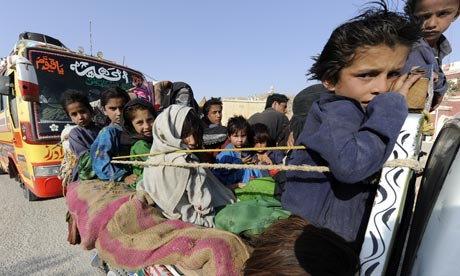The British civil rights lawyer Clive Stafford Smith and international cricketer turned politician Imran Khan will begin a peace march on 7 October into Pakistan's Waziristan region. Their aim is to highlight the plight of innocent people killed or injured by US drones.
Smith took the precautionary measure of writing to President Obama and his CIA director, David Petraeus, informing them about the march. In the letter, he requested that the president ensure the names of him and the other marchers would not be on the weekly kill list the president reviews, along with security officials, in the White House situation room. Smith wrote:
Like the sealed corridors in which the top secret kill list nomination process occurs – an account of which was reportedly leaked by theObama administration to the New York Times – Waziristan has, until now, remained in the shadows, a place about which very little is known or reported. It is hoped the march will help open the area to public scrutiny by taking media there to gather independent information."Please remember that you and I are both lawyers from the same tradition, and it would be unseemly (as well as being both illegal and upsetting for my family) if you were to authorize my assassination."
Smith's letter also highlighted problems with the president's drone strategy, such as using the same intelligence that populated Guantánamo Bay. I think it's fair to assume intelligence-gathering has improved – one certainly hopes so, considering 88% of Guantánamo's 779 detainees were cleared for release. But of greater note is how Obama campaigned against President Bush by criticising his policy of imprisoning without trial – yet has chosen to kill individuals without trial.
There's no evidence those in Waziristan deemed America's enemies have either the will or ability to threaten America from thousands of miles away, Smith wrote. The region's threat extends, at most, to Pakistan, which should be allowed to resolve its own problems – as those such as Imran Khan argue that it is capable of doing. But on this point, I sympathise with Obama, since the Pakistan government has mastered the art of emitting mixed signals and behaves as an unreliable ally. Eyebrows that were raised over Osama bin Laden being found next to the Pakistan military academy in Abbottabad have yet to find reason to be lowered.
US concern over a nuclear-armed Pakistan is also understandable, and Smith's letter acknowledged that further radicalization of Waziristan is a threat to Pakistan and global security. But the US's chosen course of action undermines its objective, resulting in damage to its reputation, a failure to win hearts and minds – evidenced by research showing 97% of Pakistanis opposed to US action within their territory – and culminating in what Smith calls the "desperate failure of US policy". Wailing Iraqi mothers and maimed Afghan children whom I saw during operational tours with the British army vouch for that. MoreStanley Kubrick's film Dr Strangelove doesn't come close to matching that logic for war room farce.
